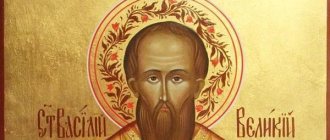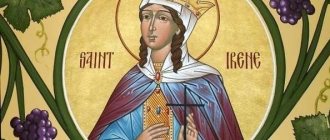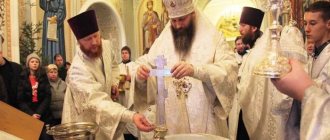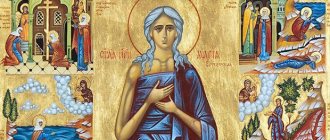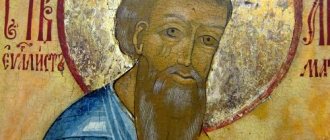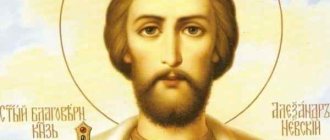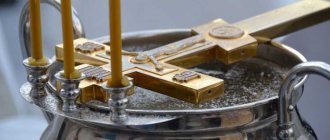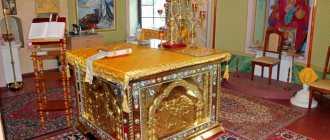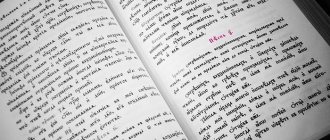History of Antonio the Great
Memorial Day: January 30
The future saint was born into a wealthy family in Egypt, and at the age of 20 he was left an orphan with a younger sister in his arms. From childhood, the young man was distinguished by sincere piety, and after the death of his parents in one of the churches he heard prophetic words about his calling to serve the Lord. After this, Antonio renounced his inheritance in favor of the poor and excommunicated himself from the world, retiring to the cell of one of the elderly believers.
After many years of reflection and conversations with the Lord, Anthony became so strong in his faith that he became an example for believers to follow. For a long time, the future saint lived in remote caves, struggling with temptations, both carnal and spiritual. It was he who founded hermit monasticism, he fought against the heresy that appeared at that moment: Arianism.
Saint Anthony died at the age of 106 and was revered and loved by many of his students and followers.
How do prayers to Saint Anthony help?
Christians celebrate St. Anthony's Day on January 30th. By offering prayer to Anthony the Great, people ask for solutions to many problems. Basically, of course, it is strengthening one’s faith and fighting temptations. If, when making a serious decision, you are overcome by doubts and you don’t know what to do, read the prayer to St. Anthony, it will definitely help you.
Protect your holy home from enemies and natural disasters, the evil eye and damage, help with diseases. All men named Anthony can turn to the Patron with a request to perform difficult work in order to avoid a wrong decision. They pray to the saint in moments of pain and pain.
What do they pray to the saint for?
Prayers addressed to Saint Anthony the Great help cope with the despondency and hopelessness that periodically visit every Christian. Read texts in the following cases:
- to strengthen in faith;
- for severe illnesses;
- when worldly temptations approach;
- if a person feels that he has been damaged or jinxed;
- for protection against natural disasters.
The ascetic Anthony is considered the patron of monasticism and all who devote themselves to prayer work for the glory of the Lord.
Prayer to St. Anthony the Great
O venerable and god-creator Antonio! We believe that you, standing before the throne of the Holy Trinity, are great and bold in your prayers to the merciful Lord God, who will always listen to you, his faithful servant and saint. For this, with tenderness, we humbly turn to You, Holy One of God: do not be silent about us, pray to the Lord God, revered and glorified in the Trinity, that, looking at us kindly, he will not allow us to perish in our sins, but may he resurrect the fallen, may he correct our wicked and cursed life, rejoicing in the sins to come, and may he forgive us all, a tree in sinful thoughts, words and deeds, from birth to this hour. You, an ascetic of virtue, weigh the weakness and pain of the present time, pray that He will bring out Christ God, that His inexpressible mercy will leave us less than we are, but protect us from worldly temptations, from the snares of the devil and from carnal desires we can receive from him everything that is necessary for temporary life, liberation from troubles and misfortunes and unceasing patience to the end. Ask us to end our life in peace and repentance and pass without restrictions from earth to heaven, but trials, demons of the air and eternal torment must be delivered, and will be deigned to enter the Kingdom of Heaven along with you and with all the saints who pleased the Lord God and Savior Jesus Christ, worthy of all glory, honor, worship, by His Father Principle and His Most Holy, Good and Life-Giving Spirit, now and forever and ever. Amen.
Venerable Anthony the Great, Egyptian
Anthony the Great was born in Egypt around 250 from noble and wealthy parents who raised him in the Christian faith. At the age of eighteen, he lost his parents and was left alone with his sister, who was in his care. One day he was going to church and thinking about the holy apostles, how they left everything to follow the Lord. He enters the temple and hears the gospel words: “If you want to be perfect, go, sell what you have and give to the poor, and you will have treasure in Heaven, and follow Me” (Matthew 19:21). These words struck Anthony, as if they were spoken by the Lord personally to him. Soon after this, Anthony renounced the inheritance from his parents in favor of the poor inhabitants of his village, but was perplexed as to whom he would leave his sister to. Concerned with this thought, he enters the temple another time and hears there again the words of the Savior addressed to him: “Do not worry about tomorrow: tomorrow will take care of itself; Sufficient for each day is his own trouble” (Matthew 6:34). Anthony entrusted his sister to Christian virgins known to him and left the city and home to live in solitude and serve the Lord alone.
The departure of the Monk Anthony from the world did not happen suddenly, but gradually. At first he stayed near the city with a pious elder who lived in solitude and tried to imitate him in everything. He also visited other hermits who lived in the vicinity of the city and took their advice. Already at this time he became so famous for his exploits that he was called “the friend of God.” Then he decides to move on. He calls the old man with him, and when he refuses, he says goodbye to him and settles in one of the remote caves. One of his friends brought him food from time to time. Finally, Saint Anthony leaves completely from inhabited places, crosses the Nile River and settles in the ruins of a military fortification. He brought with him bread for six months, and after that he received it from his friends only twice a year through a hole in the roof.
It is impossible to describe how many temptations and struggles this great ascetic endured. He suffered from hunger and thirst, from cold and heat. But the most terrible temptation of the hermit, according to Anthony himself, is in the heart: this is longing for the world and agitation of thoughts. To all this were added temptations and horrors from demons. Sometimes the holy ascetic became exhausted and was ready to fall into despondency. Then either the Lord Himself appeared or sent an Angel to encourage him. “Where have you been, good Jesus? Why didn’t you come to end my suffering first?” - Anthony cried when the Lord, after one grave temptation, appeared to him. “I was here,” the Lord told him, “and I waited until I saw your feat.”
One day, amid a terrible struggle with his thoughts, Anthony cried out: “Lord, I want to be saved, but my thoughts won’t let me.” Suddenly he sees someone similar to him sitting and working, then he got up and began to pray, then he sat down to work again. “Do this and you will be saved,” the Angel of the Lord told him.
Anthony had already lived twenty years in his solitude, when some of his friends, having learned of his whereabouts, came to settle around him. For a long time they knocked on his door and asked him to come out to them from his voluntary imprisonment; They finally decided to break down the doors when Anthony opened them and went out. They were surprised to find no traces of exhaustion in him, although he subjected himself to the greatest hardships. Heavenly peace reigned in his soul and was reflected on his face. Calm, reserved, equally friendly to everyone, the elder soon became the father and mentor of many. The desert came to life: in the mountains all around there appeared abodes of monks; many people sang, read, fasted, prayed, worked, and served the poor. Saint Anthony did not give his disciples any specific rules for monastic life. He cared only about instilling in them a pious mood, instilling in them devotion to the will of God, prayer, renunciation from everything earthly, and tireless work.
But Saint Anthony, in the desert itself, was burdened by the crowds and sought new solitude. “Where do you want to run?” - there was a voice from the sky when he was waiting on the banks of the Nile for a boat to get away from people. “To Upper Thebaid,” answered Anthony. But the same voice objected to him: “Whether you sail up to Thebaid, or down to Bucolia, you will have no peace either there or here. Go to the inner desert." This was the name of the desert that lay near the shores of the Red Sea. Anthony went there, following the passing Saracens.
After three days of travel, he found a wild, high mountain with a spring of water and a few palm trees in the valley. He settled on this mountain. Here he cultivated a small field, so that now no one needed to come to him and bring bread. From time to time he visited the brethren. The camel carried bread and water to maintain his strength during these difficult journeys through the desert. However, admirers of Saint Anthony also discovered his last solitude. Those who sought his prayers and instructions began to come to him in large numbers. They brought the sick to him; he prayed for them and healed them.
Saint Anthony had lived in the desert for about seventy years. Against his will, the proud thought that he was older than everyone here began to confuse him. He asked God to remove this thought from him and received a revelation that one hermit had settled in the desert much earlier than him and was serving the Lord more than him. Anthony got up early in the morning and went to look for this ascetic unknown to the world. I walked the whole day and did not meet anyone except desert animals. An immense space spread out before him, but he did not lose his hope. Early in the morning he went again. A she-wolf flashed before his eyes, running towards the stream. Saint Anthony approached this stream and saw a cave near it. At the sound of his footsteps, the door to the cave closed tightly. Until noon, Saint Anthony called out through the door to the unknown ascetic and asked to show him his face. Finally, the door opened and a very old man, completely white with gray hair, came out to meet him. It was Saint Paul of Thebes. He had already lived in the desert for about ninety years.
After the brotherly kiss, Paul asked Anthony: “What is the condition of the human race? What kind of government is there in the world? Are there still idolaters left? The end of persecution and the triumph of Christianity in the Roman Empire was good news for him, and the emergence of Arianism was bitter news. While the elders were talking, a raven came down to them and laid down some bread. “The Lord is generous and merciful,” Paul exclaimed. “This is how many years I have received half a loaf of bread from Him every day, but now for the sake of your coming He has sent a whole loaf of bread.”
The next morning, Paul revealed himself to Anthony that he would soon depart from the world; therefore, he asked Anthony to bring to him the mantle of Bishop Athanasius in order to cover his remains with it. Anthony hastened to fulfill the desire of the holy elder. He returned to his desert in great excitement and to the questions of his brother monks he could only say: “Sinner, I considered myself still a monk! I saw Elijah, I saw John, I saw Paul in heaven." On the way back to Saint Paul, he saw him ascending to heaven among a host of Angels, prophets and apostles.
“Why, Pavel, didn’t you wait for me? - Anthony exclaimed. “I recognized you so late and you are leaving so early!” However, when he entered Paul's cave, he found him silent and motionless on his knees. Anthony also knelt down and began to pray. After several hours of prayer, he was convinced that Paul was not moving because he was dead. He reverently washed his body and wrapped him in the mantle of St. Athanasius. Suddenly two lions appeared and with their claws dug a rather deep grave, where Anthony buried the holy ascetic.
The Monk Anthony died at a very old age (106 years old, in 356) and for his exploits earned the title of the Great.
The Monk Anthony founded hermit monasticism. Several hermits, under the guidance of one mentor - Abba, lived separately from each other in huts or caves (sketes) and indulged in prayer, fasting and labor. Several monasteries, united under the authority of one abba, were called Lavra. But even during the life of Anthony the Great, another kind of monastic life appeared. The ascetics gathered in one community, carried out joint labors, each according to their strength and abilities, shared a common meal, and obeyed the same rules. Such communities were called cenovia, or monasteries. The abbas of these communities began to be called archimandrites. The Monk Pachomius the Great is revered as the founder of cenobitic monasticism.
See also: “ The Life of Our Venerable Father Anthony the Great” as presented by St. Demetrius of Rostov.
Second prayer
O great saint of God, Reverend Father Antonio! As if you had boldness towards the Lord Christ and the Most Pure Mother of God, awaken to us unworthy (names), warm prayer book, intercede from all troubles and misfortunes, but with our prayers we will remain unharmed from enemies, visible and invisible. Pray for God's mercy to save us from our sins and set us before our destiny. Pray for His mercy so that this temple (house) will have the necessary supplies to pacify our lives and have mercy on all the parishioners of this temple and save our souls; forever and always. Amen.
